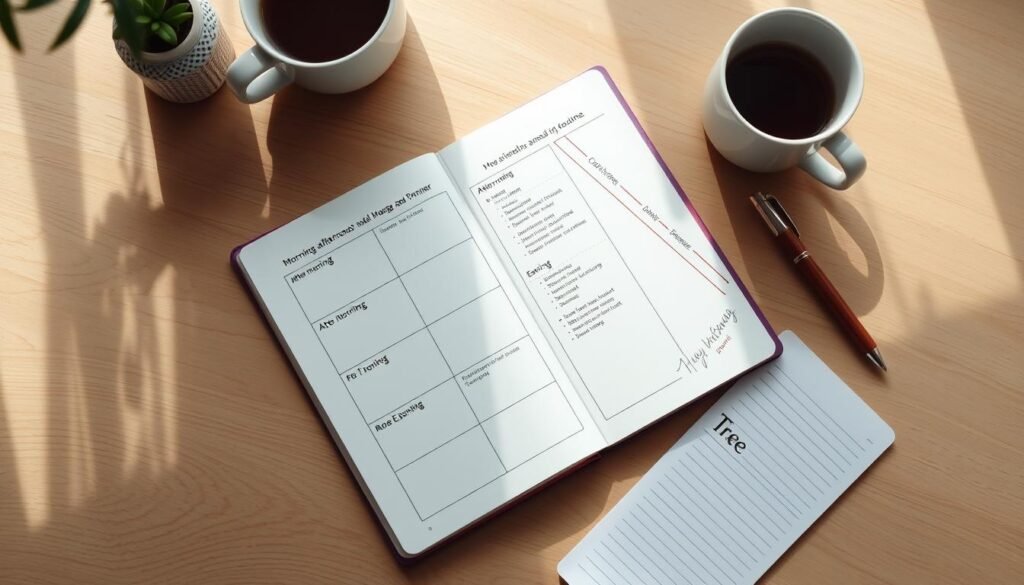Is your self-care routine just a bubble bath, or could it be the key to lasting resilience? More people are realizing that self-care isn’t a luxury—it’s a lifeline. Yet many still struggle to build a routine that truly works. This guide explores how a thoughtful self-care routine can transform well-being, no matter your experience level. For those new to self-care for beginners, this section breaks down the basics of creating practices that fit your unique needs.
Self-care routines today go beyond spa days. They include habits like mindful breathing, daily walks, or even setting boundaries. The secret? Tailoring strategies to your physical, emotional, and mental demands. Whether you’re a busy parent, a stressed student, or someone just starting out, this article shows how small, consistent steps lead to big changes.
Key Takeaways
- A well-planned self-care routine boosts physical and mental health.
- Self-care for beginners starts with identifying personal needs and priorities.
- Consistency matters more than perfection in daily practices.
- Misconceptions often block people from adopting effective routines.
- This guide offers actionable steps for all lifestyles and budgets.
Understanding Self-Care: What It Means for You
Self-care is more than just spa days or weekend getaways. It’s about taking small steps every day to care for yourself. Effective self-care practices help keep your body, mind, and spirit healthy. This way, you can face life’s ups and downs better.
By focusing on mental health self-care, you lay the groundwork for long-term well-being.
The Importance of Self-Care
Studies show that self-care can lower stress hormones like cortisol. This can help prevent anxiety and depression. It also makes you more focused and improves your relationships.
Some key benefits include:
- Boosting energy through rest and nutrition
- Preventing burnout with mindful breaks
- Strengthening emotional resilience
Common Misconceptions about Self-Care
Many think self-care is selfish or expensive. But the truth is:
- “Self-care is selfish” → It’s essential for maintaining productivity and relationships
- “Only for crises” → Daily small actions prevent bigger mental health issues
- “Requires luxury” → Walking or journaling costs nothing
“Self-care is how we nurture our capacity to care for others.” – World Health Organization
Identifying Your Needs and Goals
Before you start a self-care routine, it’s important to know what you need. Look at your current self-care habits. See what works and what doesn’t. This helps make sure your routine fits your life and what’s important to you.
Assessing Your Current Self-Care Practices
Start by doing these things to check your habits:
- Track your daily activities for a week. Note when you feel stressed or happy.
- Ask yourself: “Does my current routine meet my physical, emotional, and social needs?”
- Use tools like journaling or apps like Daylio to track your patterns.
Setting Realistic Self-Care Goals
SMART goals help make your ideas real. Here’s how to use them:
| Goal Type | SMART Example |
|---|---|
| Physical Health | Walk 30 minutes daily, 5 days a week. |
| Emotional Well-being | Practice 7-minute meditation daily at 7 AM. |
| Social Connections | Call a friend weekly for 15+ minutes. |
Change your goals as your life changes. Being flexible makes your self-care routine last.
Building a Well-Rounded Self-Care Routine
Self-care isn’t a one-size-fits-all approach. It’s about mixing physical, emotional, social, and spiritual practices. This mix helps cover all bases of wellbeing. Let’s dive into how to create a routine that fits you.
Physical Self-Care Activities
Physical health is key. Focus on:
- Regular exercise (walking, yoga, or strength training)
- Nutrition: Balanced meals with fruits, veggies, and lean proteins
- Sleep hygiene: Keep a regular bedtime and avoid screens before bed
Emotional Self-Care Strategies
Emotional health needs attention. Try these:
- Journaling to track your feelings and triggers
- Deep-breathing exercises when stressed
- Stay away from toxic environments
Social Self-Care Connections
Good relationships are crucial. Think about:
- Setting clear boundaries with others
- Joining groups or clubs
- Spending quality time with loved ones
Spiritual Self-Care Practices
Find purpose with practices like:
- Meditation or prayer
- Nature activities (forest bathing or hiking)
- Creating through music or writing
| Dimension | Examples |
|---|---|
| Physical | Yoga, meal planning |
| Emotional | Mood journaling, therapy |
| Social | Friend check-ins, support groups |
| Spiritual | Mindfulness apps, volunteering |
Creating a Daily Self-Care Plan
Starting self-care as a habit needs a clear plan. A daily self-care routine keeps your mind and body cared for, even when life is busy. Here’s how to make self-care a part of your daily life.
Morning Rituals for a Positive Start
Start your day with activities that energize and focus you. Try these evidence-based practices:
- Hydrate first: Drink water within minutes of waking to kickstart metabolism.
- Move your body: 10 minutes of stretching or yoga boosts circulation and mood.
- Set intentions: Write one goal or affirmation to guide decisions throughout the day.
- Plan tasks: Review priorities to reduce decision fatigue.
Evening Wind-Down Techniques
Wind down with routines that calm your mind and prepare your body for sleep:
- Unplug devices 1 hour before bed to lower screen light exposure.
- Incorporate deep breathing or meditation for 5–10 minutes.
- Journal reflections: Note 3 positive moments from the day.
- Prepare sleep environment: Dim lights and set a consistent bedtime.
| Morning Activities | Evening Activities |
|---|---|
| Hydration | Digital detox |
| Stretching | Journaling |
| Goal setting | Relaxation techniques |
| Task planning | Sleep prep |
Self-Care on a Budget: Affordable Ideas
Self-care doesn’t have to cost a lot. These self-care ideas focus on what matters, not the price. Start with free activities that care for your mind and body.
No-Cost Self-Care Practices
- Take a walk in a local park or neighborhood
- Practice deep breathing exercises for 5-10 minutes daily
- Write in a journal to process thoughts and emotions
- Call a friend or join a community group for social connection
Budget-Friendly Self-Care Tools
Small investments can make a big difference. Look for these items:
| Item | Use | Cost |
|---|---|---|
| Yoga mat | Home stretches or meditation | $15–$30 |
| Essential oil diffuser | Relaxation through scents | $20–$40 |
| Reusable face cloth | Natural skincare compress | $5–$10 |
“Self-care is a mindset, not a shopping list.” – National Alliance on Mental Illness (NAMI)
Get creative with what you already have. Use a cool spoon for eye care or a bath towel as an eye mask. Try free apps like Insight Timer for meditation. Choose self-care tips that fit your life, not just trends. Every small step helps you feel cared for without spending a lot.
Time Management for Effective Self-Care

Self-care isn’t a luxury—it’s a must. Treat your self-care routine as you would any important meeting. Use tools like Google Calendar or Todoist to schedule time for activities like meditation or walks. This way, they become a priority.
Scheduling Your Self-Care Time
Here are some tips to make self-care a part of your day:
- Time-Blocking: Set aside 15-30 minutes for activities like journaling or stretching.
- Digital Aids: Apps like Calendly can help schedule free time. Focus@Will provides background music to help you concentrate.
- Weekly Reviews: Spend 10 minutes each Sunday planning your self-care for the week.
| Method | Description | Time Commitment |
|---|---|---|
| Time-Blocking | Allocate fixed time slots for specific activities | Flexible (15 mins–1 hour) |
| Pomodoro Technique | Combine work with 5-minute mindfulness breaks | 5–10 minutes per session |
| Micro-Moments | Incorporate 2-minute breathers (e.g., stretching during TV ads) | 1–5 minutes |
Prioritizing Self-Care Amidst a Busy Life
See self-care as a way to improve your performance, not a burden. Mix small practices into your daily routines:
- Practice deep breathing during commute stops
- Listen to a motivational podcast during lunch breaks
- Stretch while waiting for meetings to start
“Time isn’t the barrier—perception is.”
— Time Management Institute, 2023 Study on Daily Routines
Even 3 minutes of mindful breathing or a gratitude list can refresh your focus. What’s important is being consistent, not how long you do it. Adjust your self-care to fit your life, not the other way around.
Overcoming Barriers to Self-Care
Even with good intentions, obstacles can stop us from practicing self-care. The first step is to recognize these challenges. This helps us create self-care tips that really work for us. Many beginners find it hard to start because they feel guilty or overwhelmed.
This section will give you practical steps to overcome these obstacles.
Identifying Common Obstacles
Common barriers include:
| Barrier | Quick Strategy |
|---|---|
| Guilt | Redefine self-care as a priority |
| Perfectionism | Start with 5-minute routines |
| Time constraints | Combine self-care with daily tasks |
| Social pressure | Share your goals with a trusted friend |
Strategies to Combat Guilt
“Guilt thrives on secrecy—sharing your needs with others reduces its power.”
Here are steps to fight guilt:
- Rename “self-care” as “self-responsibility” to shift mindset
- Write a script to explain your needs to others (e.g., “I’m taking a walk to recharge so I can help better later”)
- Track small wins in a journal to see progress
For self-care for beginners, start with small steps. Like a 2-minute breathing exercise. Remember, progress comes with consistent effort.
Self-Care for Different Lifestyles
Self-care needs to fit our unique lives. Find ways to care for yourself that work with your schedule. This way, you can keep up with your well-being without feeling overwhelmed.

Self-Care for Professionals
Workplaces are busy, but self-care is essential. Here are some quick tips:
- Take 5-minute mindfulness breaks with apps like Calm or Headspace
- Do posture exercises during work hours
- Set clear boundaries, like no emails after 7 PM
Self-Care for Parents
“Modeling self-care teaches children that rest is a priority—not a luxury.” – Parenting Coach Dr. Emily Carter
Make self-care fun for the whole family:
- Do yoga or read stories together
- Have weekly date nights to share time
- Use quick breathing exercises during busy times
Self-Care for Students
Students juggle school and social life. Here are some budget-friendly ideas:
- Take 10-minute walks or use wellness apps
- Join group meditation in dorms or libraries
- Prepare meals on Sundays with affordable recipes
Being flexible is important. Even small acts of self-care, like stretching, can make a big difference over time.
Adapting Your Routine Over Time
Self-care ideas change as life does. What worked six months ago might not now. Being flexible keeps your self-care relevant and meaningful.
“Routines without adaptation become rituals without purpose.”
Recognizing When to Change Your Routine
Here are signs it’s time for a change:
- Feeling less excited about activities you once loved
- Major life changes like a new job or family addition
- Changes in your physical or mental health
- Seasonal shifts that affect your mood or energy
Experimenting with New Self-Care Activities
Here’s how to find new self-care ideas:
- Try a new self-care idea every week
- Keep a journal of how you feel and your body’s response
- Replace old habits with new self-care practices
- Look for inspiration in communities or wellness blogs
Keeping an open mind keeps self-care fresh. Even small changes today can make a big difference tomorrow.
The Role of Mindfulness in Self-Care
Mindfulness turns self-care into a mindful practice. It focuses on the present, boosting mental health and daily self-care. Even small moments can lead to big changes.
Incorporating Mindfulness Practices
Start simple. Try these steps:
- Set aside 5 minutes daily for guided breathing exercises.
- Practice mindful eating: savor each bite of a meal without distractions.
- Engage in mindful movement like yoga or walking meditation.
- Pause to notice sensory details—like the feel of water during handwashing.
Benefits of Mindfulness for Self-Care
Mindfulness boosts self-awareness, helping identify emotional triggers early. A 2023 study in Journal of Clinical Psychology found regular practice reduces stress hormones by 28%. It also:
- Improves focus on priorities
- Enhances emotional resilience
- Encourages non-judgmental self-observation
“Mindfulness isn’t just a technique—it’s a lens through which we view all self-care efforts.” — Dr. Sarah Taylor, Mindfulness Research Institute
Integrate it into routines like journaling or stretching. Over time, this practice fosters a deeper connection between body and mind. It makes other self-care activities more impactful. Prioritizing presence ensures self-care isn’t just done—it’s felt.
Tracking Your Progress and Adjusting
Self-care is a journey, not a one-time task. It needs constant attention and changes. By regularly checking your self-care habits, you can make sure they meet your current needs. Here are some tips to help you stay on track and improve.
Tools for Monitoring Your Self-Care Journey
Use digital tools like the Daylio app or a physical journal to track your daily habits. Log activities such as exercise or meditation, and note any changes in your mood. Apps like Headspace also track your mindfulness progress. Pick tools that fit your life to avoid feeling overwhelmed.
Celebrating Your Self-Care Achievements
Mark your milestones, like sticking to a routine for a month or trying new self-care tips. Treat yourself to something you love, like a favorite tea or a walk. Sharing your wins with a friend can also help you stay accountable. Remember, it’s about personal growth, not comparing yourself to others.
Update your routine every 3–6 months to keep up with life’s changes. Being flexible makes self-care effective as your priorities change. Use your data to find patterns, like which activities boost your energy or reduce stress. By being adaptable, self-care becomes a lasting practice that helps you face life’s challenges. Be kind to yourself and let progress guide your habits.



